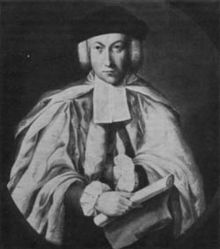John Alcock (organist)
John Alcock (born April 11, 1715 in London , † February 23, 1806 in Lichfield ) was an English organist and composer .
Life
As a child, John Alcock was a chorister at St Paul's Cathedral and in 1729 became a pupil of the little older John Stanley . A first organist position he received at St Andrew's Church in Plymouth (1737-1741), where he married Margaret Beaumont from Brompton in 1738. In 1741/1742 he moved to St Laurence's Church in Reading and 1749/1750 as organist and choirmaster at Lichfield Cathedral. During this time he was awarded a bachelor's degree in music from the University of Oxford (1755). After falling out and health problems, he gave up his job in Lichfield around 1760, but stayed there and was still musically active. From around 1765 he was organist at Sutton Coldfield Parish Church. Alcock earned a doctorate in Oxford in 1766. In the same year he became organist at the Church of St Editha in Tamworth , where he worked until 1790. Parallel worked from 1761 to 1786 at the Sutton Coldfield Parish Church.
Autobiographical details are contained in his novella The Life Of Miss Fanny Brown , which he published in 1760 under the pseudonym John Piper. With his wife († 1793) he had a son and three daughters. His son of the same name (1740–1791) was also an organist and composer. John Alcock died in 1806 at the age of 91.
plant
Alcock began composing in his early years at St Paul's Cathedral. His Six Suite's of Easy Lessons for the Harpsicord or Spinnet with a Trumpet Piece were written in Plymouth, and his Twelve English Songs in Reading in 1743 . He composed and published a range of sacred and secular music. His vocal works include secular and sacred choral music and music for soloists, while his instrumental works include chamber music and organ works. He was particularly interested in church music, choral movements and polyphonic works for use in church services. Alcock published a Harmony of Jerusalem collection with hymn tunes, many of which he had revised. In addition to 72 original psalm tunes and other hymns, he re-harmonized 117 psalm sentences and later published them in three collections. He published Divine Harmony with 55 chants in 1752 and published a collection of 26 anthems in 1771 . In the same year he published ten voluntaries for organ. A total of 48 anthems were written between 1754 and 1798. In addition to the well-known, simple phrase Wherewithal shall a young man cleanse his way , Alcock also created longer anthems with orchestral accompaniment.
literature
- John Bergsagel: Alcock, John d. Ä .. In: Ludwig Finscher (Hrsg.): The music in past and present . Second edition, personal section, volume 1 (Aagard - Baez). Bärenreiter / Metzler, Kassel et al. 1999, ISBN 3-7618-1111-X ( online edition , subscription required for full access)
Web links
- Sheet music in the public domain by John Alcock in the Choral Public Domain Library - ChoralWiki (English)
- Sheet music and audio files by John Alcock in the International Music Score Library Project
- Watkins Shaw, Peter Marr: Alcock, John. In: Grove Music Online (English; subscription required).
- Peter Marr: John Alcock (1715–1806) (English, PDF)
Individual evidence
- ↑ John Bergsagel: Alcock, John d. Ä .. In: Ludwig Finscher (Hrsg.): The music in past and present . Second edition, personal section, volume 1 (Aagard - Baez). Bärenreiter / Metzler, Kassel et al. 1999, ISBN 3-7618-1111-X ( online edition , subscription required for full access)
- ↑ Don Michael Randel (Ed.): Alcock, John. In: The Harvard Biographical Dictionary of Music. Belknap Press of Harvard University Press, Cambridge / MA 1996, ISBN 0-674-37299-9 , p. 12.
- ↑ The Life Of Miss Fanny Brown : Sheet Music and Audio Files in the International Music Score Library Project
- ↑ John Alcock Jr. 1740-1791. At Carus-Verlag , accessed on January 7, 2018.
- ^ A b Peter Marr: John Alcock (1715–1806) (English, PDF).
- ^ Robert Evans, Maggie Humphreys: Dictionary of Composers for the Church in Great Britain and Ireland. Mansell, London 1997, ISBN 978-1-4411-3796-8 , p. 4 ( limited preview in Google book search).
| personal data | |
|---|---|
| SURNAME | Alcock, John |
| BRIEF DESCRIPTION | English organist and composer |
| DATE OF BIRTH | April 11, 1715 |
| PLACE OF BIRTH | London |
| DATE OF DEATH | February 23, 1806 |
| Place of death | Lichfield |
